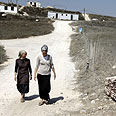

The poll, conducted in honor of Hanukkah, also asked who Israelis see as the modern-day Hellenists and what the Maccabees would think about Israel today.
The poll was conducted by Panels Institute on a sample representative of the adult Jewish population in Israel of 498 respondents. The maximum sampling error is 4.4%±.
To the question "Who are the Maccabees of our day?", 55% responded "the settlers," 20% chose the social activists, 13% chose IDF officers, 6% chose members of Knesset, and 6% chose environmental activists. In an analysis of those who chose the settler response according to religious affiliation, shows 50% of haredim, 51% of the seculars, 58% of the traditionalists, and 69% of the religious believe that the settlers are the modern-day Maccabees.
And who are the Hellenists of the 21st Century? Thirty percent believe "those who insert words from foreign languages into Hebrew or those who name their children Latin names." Some 28% said that those who want to make money at any price are the modern-day Hellenists, while 26% said people who are brand-conscious. Another 16% responded that people who watch a lot of television are manifestations of modern-day Hellenism.
Breaking down the results according to shows that seculars were most likely to indicate the desire to be famous (31%). Traditionalists were most noted the use of Latin names and words (32%). The religious public emphasized chasing after brands (31%), and haredim indicated watching television (44%) and the source of Hellenism in today's society.
Maccabees and State of Israel
The Hasmoneans were known, among other things, for secretly violating the laws of the Greek regime that forbade upholding the Torah's commandments. A clear majority of the respondents (59%) said they would participate in legal protests such as demonstrations and media spokesmanship when faced with State laws and orders antithetical to their beliefs and values.
On the other hand, 18% said they would not do anything "because it wouldn't have an effect." Some 8% said they would involve international bodies in order to revoke the laws, while 4% said they would partake in illegal and violent protest. Some 11% said they do not know how they would react.
Most of the religious affiliations preferred legal protest as their prime path of action: 66% of religious, 59% of traditionalists, 58% of seculars, and 39% of haredim.
In conclusion, the respondents were asked to estimate "what would the Hasmoneans think of the State of Israel as a Jewish and democratic state?" Some 33% responded that the Hasmoneans would think this type of country is ideal. Some 25% said the state would be considered a symbol of Hellenism in the eyes of the Hasmoneans because its laws are not based on halacha. Some 21% said the Hasmoneans would accept the State having no other choice. Another 21% did not respond.
The haredim and the religious believe the State of Israel would be seen by the Hasmoneans as a symbol of Hellenism (67% and 42% respectively). Traditionalists believe they would come to terms with the State having no other choice (31%), and the seculars said the Hasmoneans would see the State as ideal.
'No sense in coercion'
Shoshi Becker, educational director of Yesodot Center for Torah and Democracy said, "Every Jew must aspire to promote Hebrew law, but coercing keeping the commandments on a large public that does not desire to do so certainly is not possible.
"I would like to send the words of the late Rabbi Shaul Yisraeli as a message to our generation. He claimed that there is no sense in forcing commandments on a secular person with the laws of the State if this is not likely to bring him to perform them out of empathy in the future."
To the haredi and religious public who believe that the State of Israel would be perceived as a symbol of Hellenism in the eyes of the Hasmoneans, Becker reminded, "The Hasmoneans waged their struggle because they were prevented from upholding the commandments of their religion, while a democratic country is built on freedom of religion, which is mostly granted in the State of Israel."















